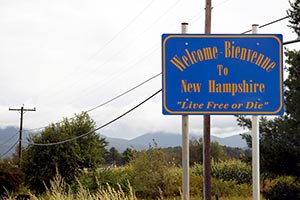New Hampshire House Committee Approves 10-Year, $3.8 Billion Highway Plan

New Hampshire’s 10-year, $3.8 billion highway improvement plan was approved by the House Public Works and Highways Committee on March 2.
House Bill 2016 includes $4 million to continue preliminary work to bring commuter rail to the Granite State. The money was added by Gov. Maggie Hassan (D) after the Republican-controlled Governor’s Advisory Commission on Intermodal Transportation refused to include the money in its recommendations.
The commission decided to use Grant Anticipation Revenue Vehicles, or (GARVE, bonds to fund two bridge projects over the Connecticut River — the Route 119 bridge between Hinsdale and Brattleboro, Vermont, and the Interstate 89 project between Lebanon and White River Junction, Vermont.
To date, GARVE bonds have been used to fund the expansion of I-93 and several projects along I-95.
The most expensive new projects are the widening of Route 101 in Bedford for $6 million and reconstructing Route 12 in Charlestown for $5.8 million.
Under the plan, several large but unfunded turnpike projects will begin at the end of the 10 years, including redoing the Amoskeag Circle in Manchester or Exit 6 and Exit 7 off I-293.
Also, several red-listed bridges on I-93 in Bow will be reconstructed beginning at the end of the plan.
The plan also advances work on the new I-93 Exit 4A project so that construction could begin by 2019, aligning it more with other work on the I-93 expansion project between Salem and Manchester.
Turnpike projects include expanding the Spaulding Turnpike from Newington to Dover, including rehabilitation of the Gen. Sullivan Bridges, widening the FE Everett Turnpike from Merrimack to Bedford, the exits 6 and 7 projects in Manchester and widening I-93 from Bow through Concord.
Committee members increased funding for red-listed bridges, and bridge preservation and paving projects. On a tie vote, $4 million in available Federal Transit Authority Funds for environmental and engineering assessment work for the Capital Corridor Rail Project remained in the bill. The work was recommended by the Capital Corridor Rail Study Committee as the next step required to move the project forward.
“Commuter rail will improve access to the entire region and provide new transportation and housing opportunities that 21st-century workers and families are looking for, spurring economic development and creating jobs,” Hassan said. “The business community continues to call on us to take action on this vital project, and this plan will help us move forward.”
The House will act on the bill later this month. If it passes it will go to the Senate, which will make its own changes to the bill and then send it to the governor for a final review.

